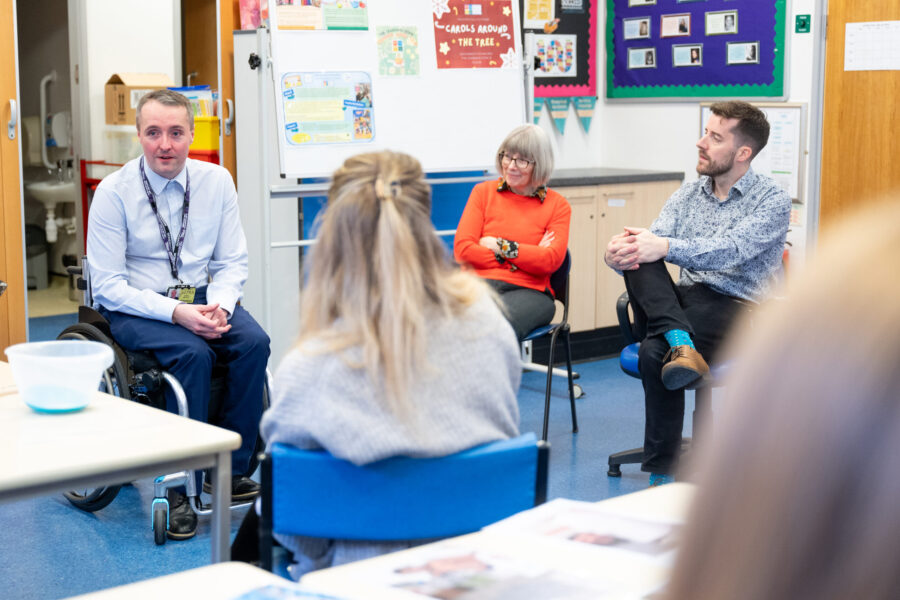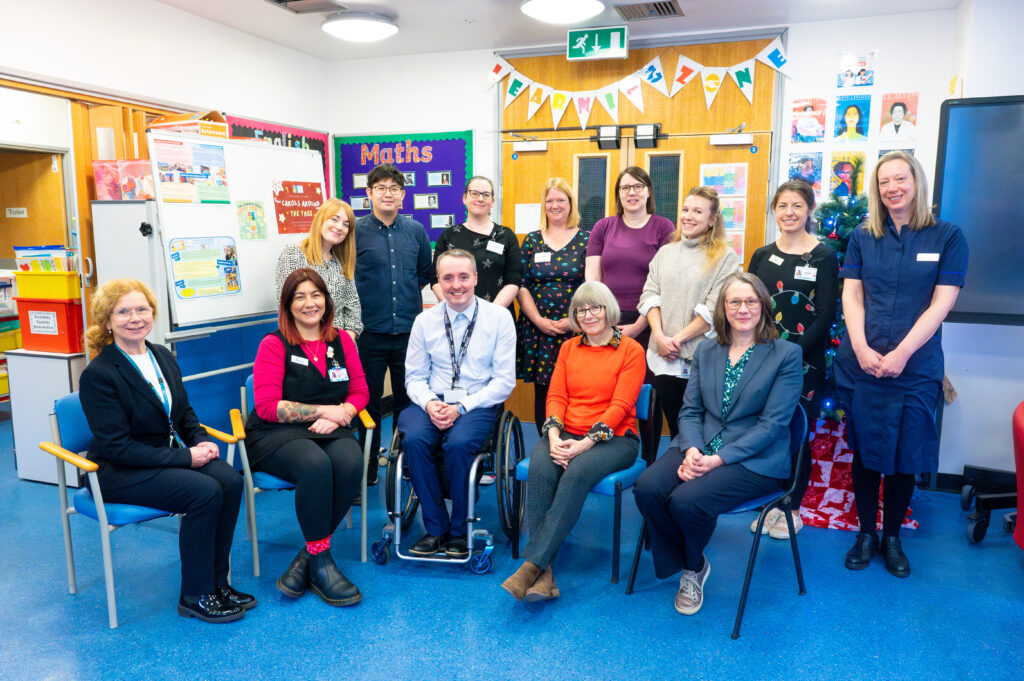
As a nine-year-old recovering in Leeds Children’s Hospital from a serious spinal injury, Joshua Gardner was able to keep up with his studies thanks to the hospital’s school classroom.
Nineteen years on to the month, Joshua, who is now NHS England’s Accessibility and Disability Lead, has returned to Leeds Children’s Hospital (Tuesday 3 December) to meet present-day teaching staff and patients.

The purpose of the visit was to enable Joshua to learn more about the vital educational resource which ensures young people admitted to hospital, as well as those recovering in the community, have continued access to high-quality educational support.
Joshua said:
‘I was cared for by the medical team at Leeds Children’s Hospital between December 2005 and summer 2006 after suffering a spinal injury called Transverse Myelitis. As a nine-year-old I may have missed most of my Year 5 education while in hospital but, thankfully, the school at Leeds Children’s Hospital stepped in and I received regular teaching to ensure I didn’t fall behind my peers.
While recovering from my injuries I would get regular visits from the teachers either to my bedside or be taken down to the classroom in my hospital bed to have lessons with the other patients from the hospital’
In addition to his position as NHS England’s Accessibility and Disability Lead, Joshua is a co-vice chair of East Specialist Inclusive Learning Centre (SILC). Leeds Children’s Hospital school is part of the Medical Needs Teaching Service (MNTS) which sits within the East SILC.
Joshua said of his role at NHS England:
‘As the Disability and Accessibility Lead my role involves championing inclusivity and ensuring disability inclusion across the organisation. I work to identify and remove barriers employees face, as well as implementing policy and process changes to improve accessibility of NHS England products for patients. I do this alongside working towards NHS England achieving Level 3: Disability Confident Leader status by 2026.
I hope my visit will raise awareness of the hospital school as a fantastic learning resource for children and young people who are inpatients or recovering in the community. Importantly, the unit offers patients a sense of normality and we want more young people to take advantage of education in hospital if they are admitted for treatment.’
As well as being a former patient, Joshua previously worked for Leeds Teaching Hospitals NHS Trust, of which the children’s hospital is a part, as communications lead for health research and innovation – leading clinical trials recruitment for the Covid-19 vaccination programme.
Gwyneth Stephen, Head of the Medical Needs Teaching Service, said:
‘For young people to be able to grow and reach their potential it’s normal to go to school full-time, and accessing education is a vital investment in their future. When children are unwell and have to go into hospital for a period of time, their right to access high-quality education continues and this is where school hospitals come in.’
Deputy Head Keeley McEvoy, who manages the hospital school, added:
‘Every child or young person who is an inpatient for at least five days receives a daily lesson. Liaising closely with wards and with pupils’ on-roll schools or colleges, specialist subject teachers are timetabled to support all pupils to continue their education, with support staff providing further enrichment.
Following guidance from our NHS colleagues, pupils will receive either a lesson in the classroom, called The Learning Zone, or be taught at the bedside. All lessons aim to include a range of activities to stimulate interest and enjoyment; we approach every child as an individual and get to know our pupils’ interests so we can personalise lessons to be engaging, fun and challenging.
We’re delighted to welcome Joshua back for his visit as he is a great role model for the effectiveness of the hospital school system.’
Fittingly, Joshua’s visit on 3 December takes place on United Nations’ International Day of Persons with Disabilities, which promotes the rights and wellbeing of people with disabilities and raises awareness of their situation in political, social, economic, and cultural life.